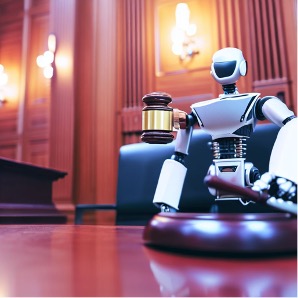[Editor’s Note: EDRM is proud to publish the Hon. Ralph Artigliere’s advocacy and analysis. The opinions and positions are Judge Artigliere’s (ret.) copyrighted work.]
In early 2023, the emergence of Generative AI (GAI) sparked concerns about job security in the legal profession. News stories propagated fears of computers and bots replacing legal professionals, leading to unsettling predictions about job loss. However, as someone deeply engaged in technology and law, I delved into this issue and identified a more optimistic perspective to consider. In this article, I will explore how GAI can enhance legal professionals’ roles and why it’s more of an opportunity than a threat.
My Initial Encounter with the GAI Job Replacement Question:
My journey into understanding the potential impact of GAI on legal jobs began at the University of Florida Law School eDiscovery Conference last February. During a break, a young engineering graduate student questioned why computers shouldn’t replace human judges. He argued that machines, devoid of human biases and shortfalls, could provide unparalleled knowledge, stamina, and reasoning abilities.
The information available to GAI is generalized public information. Lawyers withhold information in adversarial settings and keep their specialized knowledge and skills close to the vest, making it difficult for GAI to replicate specialized lawyer skills.
At that time, my knowledge of GAI was nascent, and I responded from my heart and my experience as a judge. I emphasized the importance of human judgment, ethics, and morality in complex legal matters. Judges are called upon to handle the difficult calls that lawyers and parties cannot resolve themselves, and the best option is properly trained humans subject to an oath of office with a sense of responsibility, ethics, morality, and conscience, and the ability to apply their legal training, experience, and knowledge to complex and specialized issues. However, as I continued to explore GAI, my perspective evolved.

The Broader Question: How Can GAI Enhance Legal Professionals?
Rather than focusing on job replacement, we should ask how GAI can make us better legal professionals. GAI, particularly ChatGPT and large language models, offers numerous advantages in the legal field. Lawyers are successfully using GAI to draft documents, summarize information, aid in fact research, support litigation, create exhibits, and assist in eDiscovery tasks by quickly reviewing and analyzing huge sets of documents and emails and identifying potentially relevant items for lawyers to focus on. Some legal organizations are developing closed GAI systems that prioritize confidentiality and privacy. GAI is also useful for efficiently completing administrative law firm tasks and promotional activity.
While GAI’s potential in law is undeniable, it can’t replicate the specialized thinking, logic, and sentient analysis that lawyers and judges apply to complex legal issues. The practice of law demands competence, honesty, ethics, and a commitment to lifelong learning. Lawyers and judges take oaths to uphold these standards throughout their careers.
The Limitations of GAI
GAI, while powerful, has limitations. It lacks human intuition, initiative, originality, and adaptability. These qualities are essential in legal work, which often involves unique challenges and strategies that aren’t universally shared. Accordingly the shortfalls of GAI for replacing lawyers and judges are numerous:
- Originality and imaginative application of law to facts are human skills that successful lawyers apply and are not accessible to GAI. While GAI can generate text, crafting a novel, persuasive legal argument requires human creativity and strategic thinking.
- Determining if and how a case law precedent applies to new facts requires uniquely human judgment. GAI does not truly understand case law context and significance.
- Lawyers can pick up on body language, inconsistencies, and other intangible factors during witness examinations and depositions or dealing with opposing parties. GAI cannot assess these human nuances.
- Negotiation involves strategy, concession-making, reading counterparts’ motives and emotions. GAI lacks the interpersonal skills needed for complex negotiations.
- Oral argument and court presentations rely on rhetoric, charisma, and understanding human reactions for effective persuasion. GAI falls short here.
- Giving tailored legal advice to clients requires understanding a client’s specific goals, risk tolerance and circumstances. GAI’s advice will be generalized.
- Evaluating ethical dilemmas is also a problem for GAI. Analyzing gray areas and applying legal ethics requires human discernment GAI currently does not possess. GAI cannot fully grasp these human factors.
The information available to GAI is generalized public information. Lawyers withhold information in adversarial settings and keep their specialized knowledge and skills close to the vest, making it difficult for GAI to replicate specialized lawyer skills.
The unique specialized skills of lawyers and judges ensure their roles cannot be wholly replaced by machines.
The Role of GAI in Legal Professions
GAI, including ChatGPT and large language models, will not replace judges or lawyers. However, it can complement their strengths, enhance efficiency, and improve productivity. The increasingly common saying in the GAI legal commentary that “AI will not replace lawyers, but lawyers who use AI will replace lawyers” holds true. Legal professionals who embrace GAI will likely outperform those who resist it in a competitive job market.
Debunking the Myth of Job Loss
Concerns about job security due to GAI are common, especially among law students. However, the rise of GAI should be seen as an opportunity rather than a threat. Law students today have the advantage of growing up with technology and can leverage their tech-savvy skills to stand out in the job market. Law firms will seek candidates who can harness GAI to enhance efficiency and productivity.
Embracing GAI
In conclusion, GAI is not here to take your job; it’s here to make you a better legal professional. Embrace it, learn from it, and use it to enhance your skills and career in the ever-evolving world of law. Harness the potential of GAI your advantage by seeking out opportunities to incorporate GAI tools into your legal practice. Those who do so will likely find themselves at the forefront of a more efficient and innovative legal profession. This is yet another example of the importance of ongoing learning and adaptation in the legal field to stay competitive.
The Hon. Ralph Artigliere, Copyright 2023 – ALL RIGHTS RESERVED (Published on edrm.net and JD Supra (jdsupra.com) with permission.)
NOTE: OpenAI and Claude were used to help draft and strengthen this article per EDRM GAI and LLM Policy.


